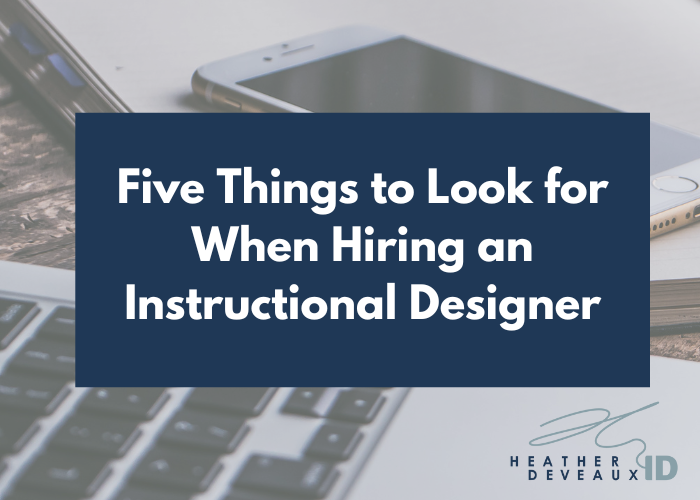What to Look For When Hiring an Instructional Designer
I recently came across someone who declared themselves an instructional designer. I once heard this same person call the field “industrial design.” So I thought it a good time to provide some experienced insight into what an instructional designer is and what it is not. And most importantly, what YOU should look for when hiring someone to collaborate on a training program or project.
What Do Instructional Designers Do?
On second thought, I will not bore you with classic definitions of what an instructional designer is and isn’t. Instead, I want to highlight what we do. Because it’s what we can do for you that you need to care about.
The beauty of what instructional designers do is that they set the stage to ensure learning happens. Curriculum developers (which I also happen to be) develop curriculum or training based on the frameworks and outputs recommended by the instructional designers. In many cases, instructional designers don’t create learning content but build the framework with which a curriculum developer will overlay materials. We’re like framers for building a house.
What instructional designers also do is consider the output of the instructors, facilitators, and those in charge of overseeing the learning. This is what makes an instructional designer so special: we don’t just tell professionals what to teach, we consider how those subject matter experts interact with and come to the material as well.
Instructional design is a nuanced dance of experience and education, but it’s more than that: instructional design is a field in which decisions are made that can have lasting and far-reaching impacts. It’s not something to be taken lightly.

What Makes My Instructional Design Services Different?
Perhaps we’re not well acquainted and you’ve found yourself on my website wondering if I can help you bring your training ideas to life. The short answer is always yes, I can help. But the long answer is right on the heels of the short answer: am I really what you need? I say this because a good instructional designer knows when it’s not their time to shine. Perhaps your project doesn’t actually need the insight and direction of a professional education expert. Perhaps your project doesn’t need to be a training program at all. But if it does and you’ve found your way here, then allow me to surprise and delight you.
My instructional design experience is hard earned and well positioned to help entrepreneurs and not-for-profits succeed in transferring knowledge from a source (subject matter expert/research) to a subject (student, entrepreneur, learner). As a graduate of a Master of Adult Education program (2018) and a recovering college instructor (that job is no joke, let me assure you), I understand what goes into getting people to learn. But as a former member of the Canadian Armed Forces and currently a successful entrepreneur, I know that wanting to learn and actually learning are two different things.
My two decades of experience in learning fields have allowed me to develop and use proprietary frameworks based on adult learning principles and instructional design models that make transferring knowledge easy. But what’s more, my experiences as an instructor ensure that I take hold of the responsibility to guide and support instructors and facilitators in their journey to transfer knowledge.
Five Things to Look For When Hiring an Instructional Designer
After tooting my own horn there for three entire paragraphs, you’re probably waiting for me to sell you on hiring me. But as I said before, you might not need me. Or any instructional designer, for that matter. I pride myself on being honest with those who reach out to work with me because it helps no one if we create a course together just for the sake of creating a course.
The easiest way to find out if you need to hire someone like me? Book a call with me. I’ll tell you. But if it is the right time to move on this project and what you need is an instructional designer, here are five things to consider before signing a contract with me or anyone else.
- How do they prove learning has happened? What measurements or metrics do they use to ensure the money you’ve spent hiring them will yield the results you’re looking for?
- Education is important: whether formal or informal, the instructional designer you hire should have MORE than a basic understanding of adult learning principles. In fact, they should be able to tell you how they use these principles in many areas of their lives, not just in creating courses. Because learning happens everywhere. Not just in the classroom or online.
- How they provide feedback is important. How they receive feedback is even more important. There’s no place for pride where learning is concerned. An experienced instructional designer is curious about how to apply what they know to your project, not dictate what they know as a way to boost their ego.
- Clarity of deliverables. If the instructional designer you hire can’t clearly articulate or show you the process they use, and explain why they use it, ask again. You want full transparency with someone who is in charge of giving you information to take to the world and teach. If you don’t know why you’re teaching something, you can’t be in charge of your project the way you really want. I loathe gatekeepers.
- Finally, you want your instructional designer to naturally and easily provide you with insight about your project for future use, ways to leverage what’s been created and provide you with the most value possible for getting longevity from a project budget. A good way to test this is to ask how previous projects are fairing in the world, including reach and skill development.
Three Things to Do if You Don’t Get What You Paid For When Hiring an Instructional Designer
Half of my business last year came from cleaning up the messes of inexperienced instructional designers taking on more than they could deliver. With so much noise about creating courses in the world today, anyone who can use learning management software thinks they can call themselves a service provider. But what I know to be true is this: telling a client you can do something and understanding WHY you would do it that way are two different things. Explaining the why is also another skill that needs to be developed. And software doesn’t do the work of explaining to clients why activities are designed a certain way.
Here are three options you can exercise when your learning projects are going off the rails and you need to recover quickly.
- Go back to the deliverables. When outlining your contract or signing one from a contractor, be sure those deliverables are clearly described so you can reference what you want. Most professional service providers are humble enough to admit when they’ve made a mistake or taken on too much, so a conversation about expectations might set you on the right track. Alternatively, it gives you leverage to dismiss the contractor because you didn’t get what you paid for. When I work with clients, we circle back to the contract expectations frequently. I do this by staying in touch between project phases and letting them know what’s coming and when.
- Ask for edits. Yes, you are allowed to ask for changes. I tell my clients upfront and often, “If you don’t like it, let me know.” Everything is a draft until it’s done, so ask for what you want. An experienced instructional designer will be able to explain to you what options are better and why. An inexperienced one will kick and scream and hide behind the title pretending they know best.
- And finally, if you’re feeling stuck and you just don’t see a way to move forward, it might be time to bring in someone who can get the job done right. Hi, it’s me.
Everyone Has to Start Somewhere
I want to end this article by saying that I would encourage anyone wanting to get into the field of instructional design to do it. It’s fast-paced, exciting, full of opportunities, and provides life-long learners like myself with endless ways to stay rooted in the learning process. I certainly don’t mean to knock someone just starting in the field who is nervous as hell to take on a client. That’s business. It comes with the territory.
But knowing your shit (ie, instructional design) is different from knowing how to run a business. And unfortunately, in our ever-increasingly-focused online world, more and more people claim to be experienced (in both areas, in fact)who aren’t. And it’s the clients who pay, literally and figuratively.
So whether you’re dreading that next call with your less-than-stellar consultant who said they could do all the things but didn’t, or you are just starting to plan a learning project and are worried you’ll get stuck in that kind of situation, we should chat. Book a call with me now and we’ll work through the concerns and ideas together. Bringing on an experienced instructional designer at the outset of a project is the best way to ensure the continuity of your project from beginning to end. But honestly, if you’re stuck, call me.







